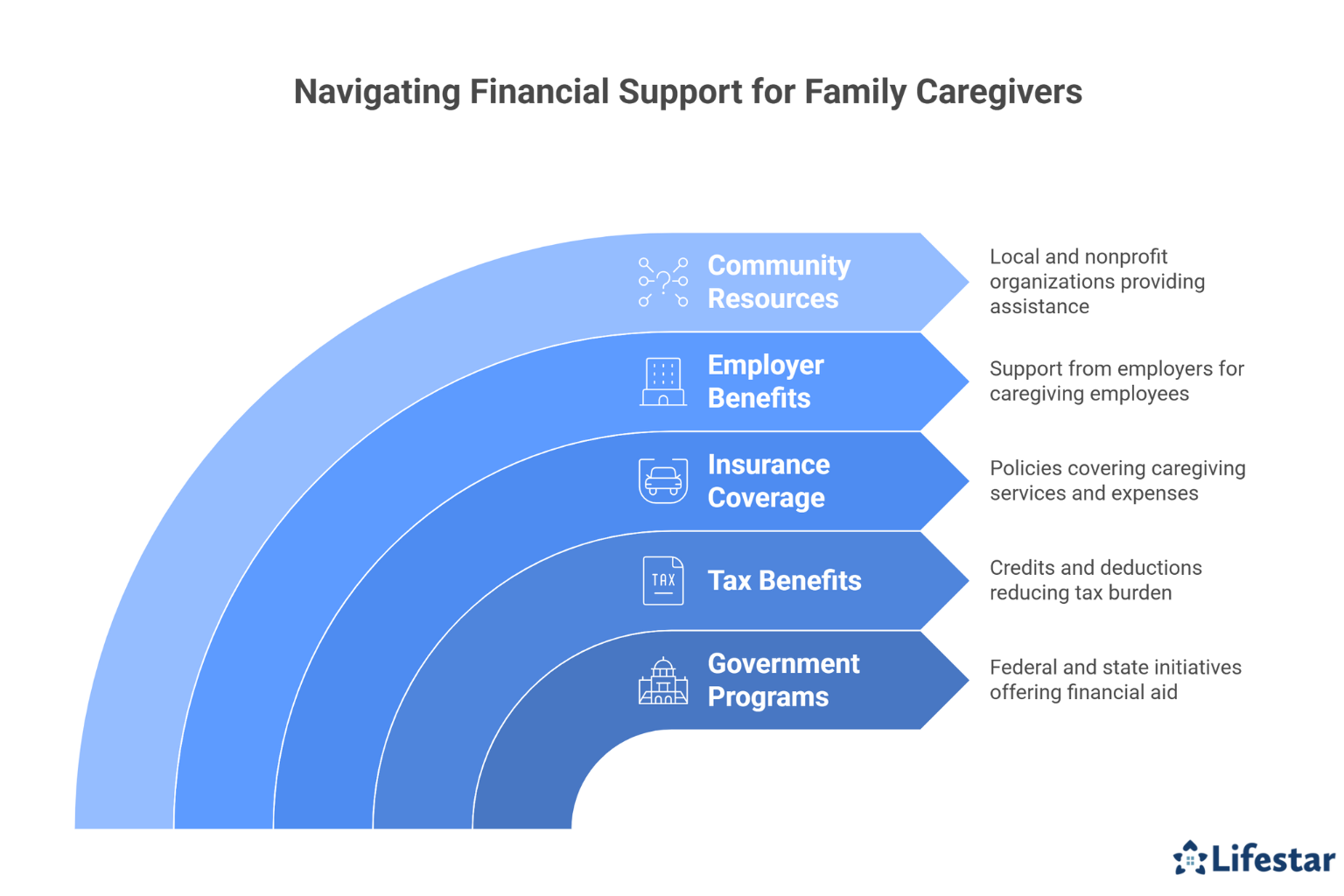
Table of Content
Family caregiving often creates unexpected financial strain on households already managing their own expenses. Fortunately, numerous assistance programs exist to offset caregiving costs and provide direct support to families navigating this challenging responsibility.
Government-Funded Caregiver Support Programs
Several federal and state programs offer financial assistance specifically designed for family caregivers supporting aging or disabled relatives.
Medicaid waiver programs allow states to provide home and community-based services that might otherwise require nursing home placement. These programs often include:
- Personal care assistance
- Respite care services
- Adult day care programs
- Home modifications for safety and accessibility
- Transportation to medical appointments
The National Family Caregiver Support Program provides funding through Area Agencies on Aging for:
- Information and assistance services
- Individual counseling and support groups
- Respite care to give caregivers temporary relief
- Supplemental services like emergency response systems
- Limited financial assistance for caregiving supplies
Veterans Administration (VA) benefits offer extensive support for families caring for eligible veterans, including:
- Aid and Attendance benefits for veterans requiring daily assistance
- Family caregiver stipends through the Program of Comprehensive Assistance
- Respite care services and training for family caregivers
- Home modifications and adaptive equipment
Your loved one’s home care needs could vary according to his or her ability to accomplish everyday tasks. There are a variety of reasons family caregivers should consider respite care. Oklahoma City, OK, families often have additional responsibilities that make it more challenging to provide the care their senior loved ones need and deserve. A professional home caregiver can take over your important caregiving duties, allowing you more time to focus on yourself.

Tax Credits and Deductions for Caregivers
Understanding available tax benefits can significantly reduce the financial burden of family caregiving responsibilities.
The Child and Dependent Care Credit applies when caring for parents who cannot care for themselves and qualify as dependents. This credit covers up to $3,000 in caregiving expenses for one dependent or $6,000 for two or more dependents.
Medical expense deductions allow families to deduct qualifying medical costs exceeding 7.5 percent of adjusted gross income. Eligible expenses include:
- Medical equipment and mobility aids
- Home modifications for medical necessity
- Transportation costs for medical appointments
- Prescription medications and medical supplies
Dependent exemptions may apply when parents meet specific income and support requirements, potentially reducing overall tax liability while acknowledging caregiving financial responsibility.
The type of home care seniors need can vary. Some need assistance a few hours a day, while others require more extensive around-the-clock assistance. At Lifestar Home Care, we tailor our care plans based on each senior’s individual care needs, and the plans can be adjusted at any time.
Insurance-Based Financial Support
Various insurance programs provide coverage for caregiving services and related expenses families might otherwise pay out of pocket.
Long-term care insurance policies often cover:
- In-home care services and personal assistance
- Adult day care program costs
- Respite care for family caregivers
- Home modifications and safety equipment
Medicare benefits include limited coverage for:
- Skilled nursing care following hospitalization
- Physical therapy and occupational therapy services
- Durable medical equipment rentals
- Home health aide services under specific circumstances
Medicaid programs vary by state but typically provide more comprehensive long-term care coverage for qualifying individuals, including extensive in-home support services that reduce family caregiving demands.
Employer-Sponsored Caregiver Benefits
Many employers now recognize the challenges faced by employees managing family caregiving responsibilities and offer supportive benefits programs.
Flexible Spending Accounts (FSAs) for dependent care allow employees to set aside pre-tax dollars for qualifying caregiving expenses, including:
- Adult day care services
- In-home care assistance
- Transportation services for dependents
Employee Assistance Programs (EAPs) frequently provide:
- Referral services for local caregiving resources
- Short-term counseling and support services
- Legal consultation for caregiving planning
- Financial planning assistance for long-term care needs
Paid family leave policies enable employees to take time off for caregiving responsibilities while maintaining income and job security, reducing the need to choose between employment and family obligations.
Community and Nonprofit Resources
Local organizations and national nonprofits offer various forms of financial assistance and resource support for family caregivers.
Area Agencies on Aging coordinate local services and may provide:
- Emergency financial assistance for caregiving crises
- Voucher programs for respite care services
- Equipment loan programs for mobility aids
- Transportation services and meal delivery programs
Disease-specific organizations like the Alzheimer’s Association and American Cancer Society offer:
- Grants for caregiving supplies and services
- Emergency financial assistance programs
- Equipment and resource libraries
- Educational programs and support groups
Faith-based and community organizations often maintain:
- Emergency assistance funds for local families
- Volunteer programs providing free caregiving support
- Meal preparation and delivery services
- Transportation assistance for medical appointments
Religious congregations and community centers frequently coordinate informal support networks that provide practical assistance and reduce caregiving costs for participating families.
If you have a senior loved one who needs help maintaining a high quality of life while aging in place, reach out to Lifestar Home Care, a leading provider of home care Oklahoma City families can trust. Our caregivers help seniors focus on healthy lifestyle habits such as eating nutritious foods, exercising regularly, and maintaining strong social ties, and we offer mentally stimulating activities that can boost cognitive health and delay the onset of dementia. Call one of our Care Managers today to learn about our customized in-home care plans.